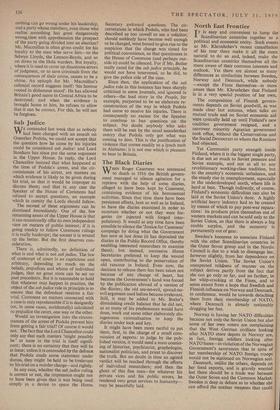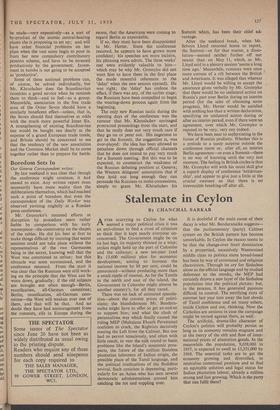North East Frontier
IT is easy and convenient to lump the
Scandinavian countries together as a political and economic entity. Such events as Mr. Khrushchev's recent cancellation of his tour there make it all the more natural to do so and, indeed, make the Scandinavian countries themselves all the more aware of their common interests and outlook. Yet there are almost as many differences as similarities between Sweden, Norway and Denmark, while nobody —except the Finns themselves—is more aware than Mr. Khrushchev that Finland is in a very special position of her own, The composition of Finnish govern- ments depends on Soviet goodwill, as was made clear last autumn, when talks on mutual trade and on Soviet economic aid were cynically held up until Finland's new coalition government resigned, and a narrower minority Agrarian government took office, without the Conservatives and the Social Democrats to whom the Russians had objected.
Yet Communist party strength inside Finland, where it is the biggest single party, is due not so much to Soviet pressure and Soviet example, and not at all to any revolutionary working-class tradition, but to the country's economic unbalance, and the steady rise in unemployment, especially in the underdeveloped north, where life is hard at best. Though indirectly, of course, Finland's economic difficulties can also be laid at the Soviet Union's door. A highly artificial heavy industry had to be created by means of which to pay post-war repara- tions: its products price themselves out of western markets and can be sold only to the Soviet Union, so that there is always a big rouble surplus, and the economy is permanently out of gear.
Sweden's keenness to associate Finland with the other Scandinavian countries in the Outer Seven group and in the Nordic Council is due to a wish to disengage her, however slightly, from her dependence on the Soviet Union. The Soviet Union's unexpected mildness of manner on the subject derives partly from the fact that she can go only so far, and no farther, in her whip-cracking at the Finns, and to some extent from a hope that Swedish and Finnish influence on Norway and Denmark, in conference, would be towards detaching them from their membership of NATO, where Denmark is already noticeably dragging her feet.
Norway is having her NATO difficulties because not only the Soviet Union but also some of her own voters are complaining that the West German civilians looking after NATO store depots in Norway are, in fact, foreign soldiers looking after NATO bases—in violation of the Norwegian Government's assurances that in spite of her membership of NATO foreign troops would not be stationed on Norwegian soil.
Denmark, unlike the others, depends on her food exports, and is gravely worried lest there should be a trade war between the Outer Seven and the Common Market. Sweden is deep in debate as to whether she can afford the nuclear weapons that could be made—very expensively—as a sort of by-product of the atomic central-heating plants she is proposing to set up; and will have other financial problems on her plate when the vast sums begin to pour in from her new compulsory contributory pension scheme, and have to be invested productively by the government. Invest- ment in bombs is not going to be accepted as 'productive'.
Some of these national problems can, of course, be solved individually, but Mr. Khrushchev does the Scandinavian countries a good service when he reminds them to think—and to feel—as a group. Meanwhile, association in the free trade area of the Outer Seven should have a similarly beneficent effect—unless, that is, the Seven should find themselves at odds with the much more powerful Inner Six. A strengthening of existing Scandinavian ties would be bought too dearly at the expense of a grand European trade tussle, and Britain should be concerned to see that the tendency of the new association and the Common Market shall be to come together rather than to prepare for battle.































 Previous page
Previous page